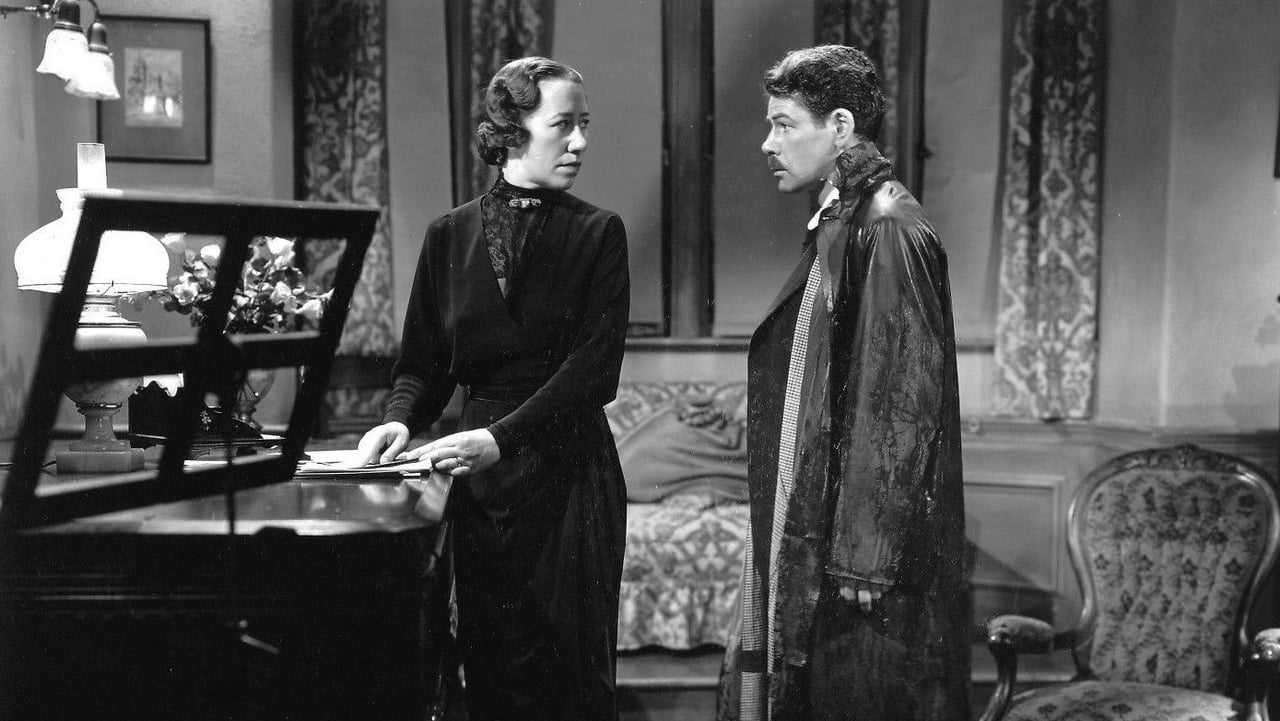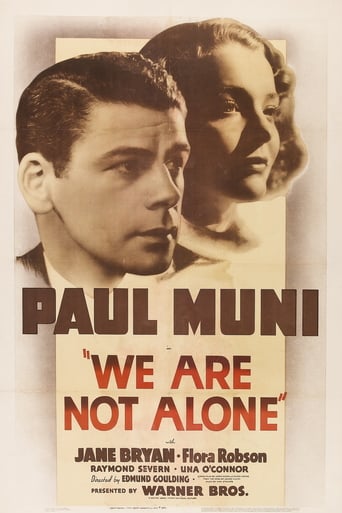Manthast
Absolutely amazing
Melanie Bouvet
The movie's not perfect, but it sticks the landing of its message. It was engaging - thrilling at times - and I personally thought it was a great time.
Kamila Bell
This is a coming of age storyline that you've seen in one form or another for decades. It takes a truly unique voice to make yet another one worth watching.
Haven Kaycee
It is encouraging that the film ends so strongly.Otherwise, it wouldn't have been a particularly memorable film
blanche-2
Noel Coward said Jane Bryan was one of the best actresses on the planet after seeing "We Are Not Alone," from 1939. This beautiful woman led a charmed life. After making two more films, she married the owner of Rexall Drugs and retired. I'd say she did okay."We Are Not Alone" is based on the novel by James Hilton and stars, besides Bryan, Paul Muni, Flora Robson, and Una O'Connor. I didn't read the novel, so I'm unclear whether it was a love story or a story making an antiwar statement, or managed to do both things in a less choppy manner than the film. In any case, the film, set in England at the start of World War I, does a complete turnaround midstream and becomes about something else.Muni plays an absent-minded, sweet, respected doctor, David Newcombe, who lives in a village with his wife Jessica (Robson) and young son Gerald. Gerald is overimaginative, easily frightened, and his mother's response is to be too harsh and disciplinary. Fortunately, he has his father to balance things out.David encounters Leni (Bryan) when she becomes his patient. She's Austrian and is a dancer, but when she becomes injured, her work becomes too difficult. At one point, he brings Gerald with him when he treats her, and, hearing about how good she is with the boy, Jessica thinks she might be a great nanny. She hires her.It's not long before gossip starts, and Jessica becomes jealous and also doesn't like the fact that Leni was "on stage" and at one point attempted suicide. She and David argue, with David refusing to fire Leni. Jessica angrily brings the boy to live with her brother.When the town erupts in anti-German sentiment, David realizes that he has to get Leni out of the country immediately.This is a disappointing film, to say the least - I mean, what happened to the Hayes code? The Hayes code wanted everybody punished for their sins, so how come people are punished when they don't commit any? I really had a major problem with this.Una O'Connor as the troublemaking maid is a shrew right out of hell. The little boy, played by David Severn, is adorable, and his innocent smile at the end of the film will make you cry. Someone wrote that the end is life-affirming. In a way, I guess it is. Still, it bothered me.So much for wanting to end Thanksgiving on an upbeat note.
MartinHafer
Okay, I'll admit this is NOT a perfect film. However, given the talent of Paul Muni, an interesting story by James Hilton AND the full MGM treatment, this is still an exceptional film. Two things that stand out particularly for me is the amazing awfulness of Muni's wife--she's so bad you can't stop watching. Second, is the very unusual plot involving the advent of WWI and xenophobia run amok that results in the public condemning an innocent woman simply because she is Austrian. ABout the only people I would NOT recommend this to are people who HATE older movies (I feel VERY sorry for you) and people who really need happy endings (you won't find one here).
jaykay-10
Part One of this interesting film concerns the loveless marriage of a kindly, patient and gentle village doctor to his cold, repressed and shrewish wife; each of them, as well as their young son, becomes a victim of this unfortunate union. Further domestic complications ensue when a young woman, adrift in the world and manifesting suicidal tendencies, enters their lives. Her obvious capacity to give and receive love captivates the doctor and his son, but increases the wife's bitterness and adds to the already considerable domestic tension. But all of this becomes secondary about 2/3 of the way through when a contrived circumstance results in the wife's death, which we know to be accidental but the law sees as a conspiracy between the doctor and the young woman to murder her. Thus, Part Two: arrest, incarceration, trial. Following a guilty verdict, the miscarriage of justice moves to the background, and we are given Part Three: scenes of stoic acceptance and acknowledgement of a highly spiritual love between the doctor and the young woman, both of whom have been condemned to die. This promising tale loses its way not once, but twice. The unity it requires is noticeably lacking. A further distraction (because it does not meld with the main story) is the screen time devoted to villagers persecuting Germans earning a living in England as the clouds darken with the imminence of World War II. There are excellent performances by two of the cinema's very best: Paul Muni and Flora Robson. The rest of the cast is impressive as well. If only the writers and director had been more conscientious about joining the parts.
shelley-6
Paul Muni and Jane Bryan give an outstanding performance in this drama. Taken from a novel by James Hilton, this story concerns a village doctor, his wife, and a plain German girl who became their little boys governess. Most of the movie is of the trial of the doctor and the governess who are accused of killing the mean spirited doctor's wife. The love between the simple doctor and the German governess is so tender that your heart goes out to both of them.. Jane Bryan, a young actress from the Warner lot was an outstanding actress, but a few years after making this movie, she quit making films and seemed to disappear completely. It was our loss.

